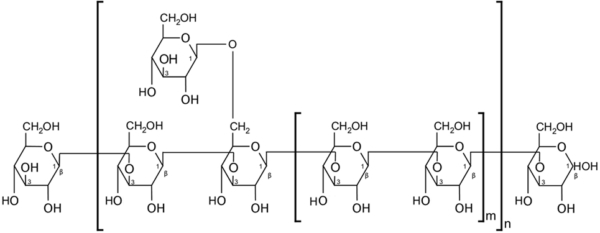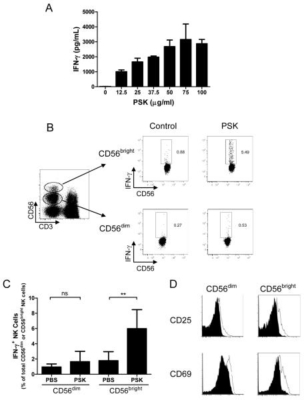This article was originally published on Psychedelic Spotlight and appears here with permission.
A general review of 13 studies found that when coupled with conventional cancer treatments, patients given anywhere from 1-3.6 grams of turkey tail mushroom every day experienced a 9% reduction in 5-year mortality compared with the control group.
Out of all of the superfood mushrooms I commonly forage (and among those sold in health food stores), turkey tail is both the most common and one of the most commonly talked about these days. Among the reasons why this mushroom is gaining so much traction in the public eye is that there is increasing evidence that turkey tail mushrooms may be able to fight cancer. The species, Trametes versicolor, is found on all continents besides Antarctica (and it may even be present there, undocumented, although this is somewhat unlikely because the conditions there don’t really lend itself to the fungus’s fruiting preferences), proliferates in a variety of mixed woods, and can be found throughout the year in large, colorful clusters of fan-shaped “turkey tail” bouquets. It is my personal favorite commonly observed mushroom for a variety of reasons, including its documented ability to fight cancer.
How To Identify Turkey Tail
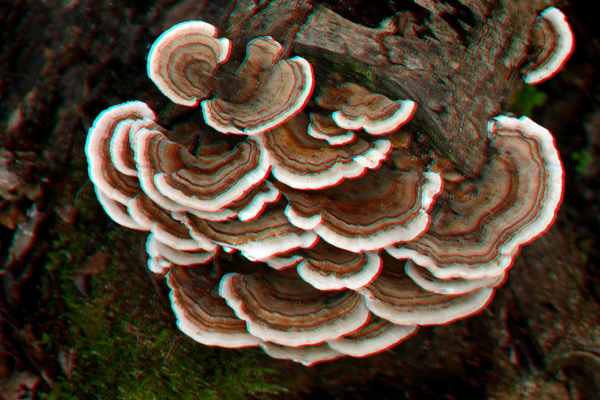
The fruiting body of the mushroom consists of concentric ring shapes that come in a range of colors.
Identifying the species isn’t particularly difficult once you know what to look for. The fruiting body of the mushroom consists of concentric ring shapes that come in a range of colors (hence the species name, “versicolor”), from grey and blue to red, gold, and brown, with a layer of velvety fine hairs on the colorful top side, and densely clustered, white or off-white pinpoint pores on the underside which are just large enough to be observed with the naked eye. Out in the field, on mycological association forays, it has also been pointed out to me that when the mushroom is cut in half, a tiny, thin, solid black line can be observed serving as a mid-layer running along the part of the mushroom between the velvety top layer and the porous underside. The fungus fruits in large bracketing shelves that make their way up (or along) the trunks of decaying wood matter, and fruit directly from the wood itself, lacking any prominent stem (or “stape,” in proper mushroom terminology). The odor is pleasantly fungal–I would describe it as the deep musky scent of the forest, itself. The mushroom can also be chewed as gum if you find you enjoy the flavor, and some foragers and mycologists can be seen chomping away on a bit of turkey tail, which is just one of the ways to receive some of its medicinal benefits. If you’re out in the woods and find a large cluster of colorful concentric bracket fungi with these characteristics, you’re in luck: you’ve found some turkey tail!
So, if this mushroom is indeed so common and so otherwise, “basic” (it’s truly hard to go out into the woods and not find turkey tail), why is it such a hot topic? The mushroom boasts a number of truly amazing health benefits, including the ability to fight cancer, a claim which is supported by an ever-increasing base of research.
So, How Does Turkey Tail Fight Cancer?
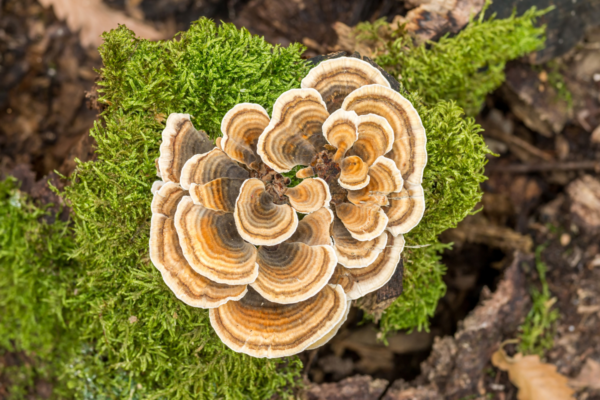
When coupled with conventional cancer treatments, patients given anywhere from 1-3.6 grams of turkey tail mushroom every day experienced a 9% reduction in 5-year mortality.
A general review of 13 studies found that when coupled with conventional cancer treatments, patients given anywhere from 1-3.6 grams of turkey tail mushroom every day experienced a 9% reduction in 5-year mortality compared with the control group. These types of cancers included breast cancer, colorectal cancer, and gastric cancer. But how is it exactly that turkey tail mushrooms fight cancer in the body?
A single sample of turkey tail mushroom contained more than 35 beneficial phenolic and antioxidant compounds, including flavanoid antioxidants like quercetin and baicalein, which in recent years have been flying off the shelves of vitamin stores due to their immune boosting properties. Many of the key cancer-fighting benefits come from compounds found in the mushroom called “polysaccharides.”
One study determined that a single sample of turkey tail mushroom contained more than 35 beneficial phenolic and antioxidant compounds, including flavanoid antioxidants like quercetin and baicalein, which in recent years have been flying off the shelves of vitamin stores due to their immune boosting properties. Many of the key cancer-fighting benefits come from compounds found in the mushroom called “polysaccharides.”
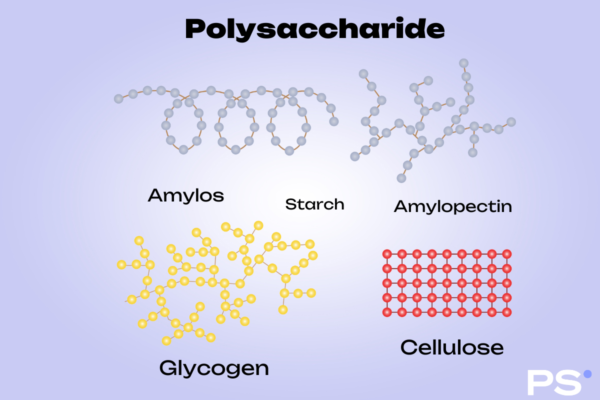
Polysaccharide characteristics
These chemicals act in various ways within the body, and in separate studies have been found to have both anti-tumor effects and generally immune boosting and immune modulating effects, all of which seem to act synergistically to improve one’s likelihood of beating cancer. Another type of compound found in turkey tail, beta-glucans, contain immune-modulating properties, meaning that they can calm an overactive immune system or activate an under-stimulated nervous system, which may contribute to the body’s ability to detect and fight tumors within itself. These various compounds simultaneously work both against tumors and in concert with the human immune system to strengthen what needs to be strengthened and fight off what needs to be fought, with little stress or damage to the body itself, in ways which I’m about to describe.
PSP promotes immune responses via induction of immunoglobulin production and engagement of various pattern-recognition molecules. | Frontiers in Immunology
One of the key beneficial compounds contained within turkey tail, polysaccharopeptide or “PSP,” was found to increase monocytes, a type of white blood cell which fights infection. It was also found to inhibit the growth of tumor activity with little negative effect on other systems of the body or on cellular activity, potentially becoming a preferred treatment option when compared with other medications and their damaging side-effects. A separately conducted study showed that PSP increased beneficial gut bacteria, which is also hugely beneficial to the human immune system overall, especially in an immune system which may already be compromised by chemotherapy or antibiotics. These synergistic benefits spanning across multiple bodily systems all indicate that turkey tail mushrooms can be utilized to fight cancer, attacking diseases such as cancer from multiple fronts. And with so many other studies indicating that there are virtually no negative side effects or bodily harm caused by turkey tail, the mushroom continues to look like a more and more promising alternative.
A study conducted on another turkey tail polysaccharide called TSK, or “Krestin”, found that Krestin inhibited the growth and spread of human colon cancer cells. And while this study was specific to colon cancer, it’s possible that other studies can and will be conducted which reveal similar results with other types of cancer. The future is bright for turkey tail in the fight against cancer! Krestin was also found to stimulate dendritic cell activity, providing increased immunity to toxins (including but not limited to medications). Additionally, it activates a type of white blood cell called “macrophages,” which aid the body in fighting off unwanted pathogens, among other essential immune functions.
PSK stimulates IFN-γ production from CD56bright NK cells. (A) Dose-dependent induction of IFN-γ secretion by PSK. Shown are IFN-γ concentrations (mean±SD) in culture supernatant from duplicate culture wells of PBMC stimulated with different concentrations of PSK for 24 hours. | NIH
Yet another turkey tail compound, CVG, was demonstrated in a clinical study to reduce tumor size when administered daily to tumor-bearing mice, and to suppress certain types of tumors. The study conducted a comparison between CVG and Cyclophosphamide, a chemotherapy drug, and determined that although Cyclophosphamide was more effective at suppressing tumors, CVG was overall preferable due to the lack of stress it imposed upon the body.
Perhaps most famously, world-renowned mycologist Paul Stamets gave a viral TED Talk “6 Ways Mushrooms Can Save The World,” dealing with his mother’s use of turkey tail in her fight against breast cancer, and submitted a case study on the subject. To say that all of this compiled data is encouraging would be an understatement.
The Best Part: It’s Everywhere!
And to me, as a forager and mycophile, the absolute best part about all of this is that this mushroom is literally everywhere. It is easy to consume as a tea, or can be extracted with alcohol into a tincture, or dried and ground into a powder and consumed in capsules. I personally use it in tea most often, but do also make tinctures with it from time to time. I’m told it can be used to flavor soups, but I have found it can occasionally be slightly bitter (though it does have a nice umami essence to it!), so I haven’t tried this personally. Up to 9 grams have been found to be well-tolerated daily in humans with no side effects.
Benefits of Turkey Tail Mushrooms
There are way more benefits to taking turkey tail than just the mushroom’s ability to fight cancer, including increased energy and benefits to organs such as the liver and kidneys, but all of that would be enough to fill another entire article. But in conclusion, there is a vast body of research which continues to accumulate to support the claim that yes, turkey tail mushrooms can indeed fight cancer. And given their ready abundance in nature, the news that these mushrooms might literally be little life savers against one of the leading causes of death worldwide couldn’t come at a better time! I encourage everyone to research more about turkey tail, and to try some yourself after doing your research on properly identifying them. The benefits are seemingly endless, and may indeed help to fight (and prevent) cancer!
Benefits:
- Increases energy
- Full of antioxidants
- Improves liver and kidney function
- Improves Immune Function in People With Certain Cancers
- Has Immune-Boosting Polysaccharopeptides
- Increases Efficacy of Certain Cancer Treatments
- Improves Gut Bacteria
Other Benefits
Turkey tail may offer additional health benefits beyond what's already been mentioned, such as:
- May fight HPV: An extensive investigation involving 61 participants diagnosed with HPV revealed that 88 percent of those treated using turkey tail achieved successful outcomes, including the clearance of HPV illness, as opposed to only 5% in the control group.
- Reduces inflammation: Abundant in antioxidants, like flavonoids and phenols, Turkey tail may have the power to reduce inflammation associated with various chronic diseases including diabetes and certain cancers.
- Has antibacterial qualities: An experiment conducted in a test tube revealed that turkey tail extract successfully inhibited the progression of Staphylococcus aureus and Salmonella enterica, two potentially hazardous bacteria.
- Could enhance athletic performance: A mouse study revealed that the ingestion of turkey tail extract improved exercise performance and reduced fatigue in comparison to mice who did not take it. Additionally, researchers observed a drop in blood sugar levels both at rest and after exercising among those given the Turkey Tail supplement.
- May improve insulin resistance: A recent study conducted on rats with type 2 diabetes revealed that the consumption of turkey tail extract had a remarkable effect in reducing blood sugar levels and improving overall health.
-
Nuestro contenido en Español:
- Pánico y Locura en Las Vegas: Así Era la Delirante Casa del Autor
- Hongos Alucinógenos: Cómo Cosecharlos Paso a Paso
- Arte Psicodélico
© 2025 Benzinga.com. Benzinga does not provide investment advice. All rights reserved.
Trade confidently with insights and alerts from analyst ratings, free reports and breaking news that affects the stocks you care about.
Cannabis is evolving—don’t get left behind!
Curious about what’s next for the industry and how to stay ahead in today’s competitive market?
Join top executives, investors, and industry leaders at the Benzinga Cannabis Capital Conference in Chicago on June 9-10. Dive deep into market-shaping strategies, investment trends, and brand-building insights that will define the future of cannabis.
Secure your spot now before prices go up—this is where the biggest deals and connections happen!
